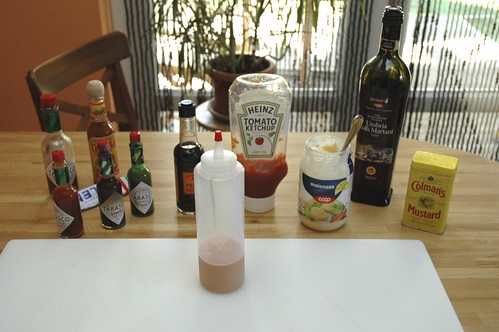Some ingredients in the secret sauce of taking your writing to the next level are more basic than others. But like any secret sauce, it works a lot better with the right foundation.
So, what kind of foundation do you need to apply the secret sauce?
The extreme basics of grammar, formatting, etc.
Believe it or not, it’s possible to get published—by a trade publisher, even!—without a firm grasp on the grammatical concept of a “sentence.” However, the odds are pretty hard against it.
Grammar is a basic building block of writing. You don’t have to diagram your sentences or understand the definition of a periphrastic tense, but I think it’s a good idea to understand how to write a complete sentence, and how to make your subjects and verbs agree, before you dwell on any other part of your writing craft.
Some craft basics
This list might be somewhat arbitrary, but here are a few of the things that I studied, learned or just formed opinions within my first couple novels. (Yeah, that long.)
Understand telling versus showing
Note that this doesn’t say “always execute telling versus showing perfectly.” It means that you need to understand what both of them are, so that you can catch yourself and understand how to fix it when others catch it in your writing.
Understand POV
I’m a POV purist, but understanding the basics of modern point-of-view is a basic of writing saleable fiction. Know what head hopping is, know who your POV characters are, know how to choose them well.
Understand basic character sympathy
With my first couple novels, I assumed that my readers would automatically sympathize with my main character.
This is not true.
After receiving my first real critiques, I saw how important it is to build character sympathy, so it was one of the first things I really set out to study. (And that’s why it’s also one of the first series I did on this blog!) Without character sympathy, nobody will read past the first chapter.
Critique and be critiqued
Critically examining someone else’s fiction with an eye toward helping them improve it helps you do the same for your own. Similarly, getting quality feedback from someone else helps you see things you couldn’t, look at your fiction through new eyes, and learn more about writing craft in the most personalized and hands-on way possible.
Read
Because, seriously, how else can you write?
Tried to write fiction in any form
The most important prerequisite, though, is that you’ve at least tried to write fiction, any length, any form. Setting that goal and making that effort is the first step that lays the groundwork for everything else above, everything we’ll read in the series, and everything you’ll learn about writing.
Discouraged?
Don’t be! Notice that everything above can be learned—and it can be learned through practice. Despite the myth of the perfect first draft and its naturally talented author, nobody is born knowing every advanced writing technique. All of these “prerequisites,” and even the ingredients of the secret sauce can. be. learned.
And, frankly, the “secret sauce” will vary from person to person. Maybe you’ve grasped several of the concepts I’ll cover in the series, but are still working on the above. That’s okay. We all learn different things at different paces—and that’s fine. There are things we all need to learn and refine and work on, either in drafting or revision or revision or revision (there’s a reason that’s in there three times!).
What my “secret sauce” did for me
So will all this stuff work?
My “secret sauce” recipe base is the steps I took over the course of a couple years, focused mainly on improving one novel. But first, I submitted this one novel to an editor I met at a conference and got a fairly quick rejection (with very useful feedback). I continued to learn and grow and apply and refine, until I was finally ready to resubmit the same manuscript to the same publisher—always a big risk, but even more so when it came directly against the advice of another editor for the same publisher.
I did it anyway.
It was accepted.
My secret sauce took an unpublishable manuscript to a publishable one. Like I said, the ingredients in your secret sauce will probably be different, but pretty much everyone has something new they can learn to improve their writing craft.
What do you think are the most basic aspects of writing craft and the business of writing? Come join the conversation!
Photo credits—secret sauce ingredients: Paolo Valdemerin



Aside from the ones you’ve mentioned, we discussed one in a writer’s group meeting yesterday. Know your characters on a personal level. Know their hobbies, habits, where and how they grew up. It gives you things to draw on to make your characters real.
I love your secret sauce! It’s the proverbial “secret to success”! Where did I hear that from??
Keep up the good work, I love the helpful hints!